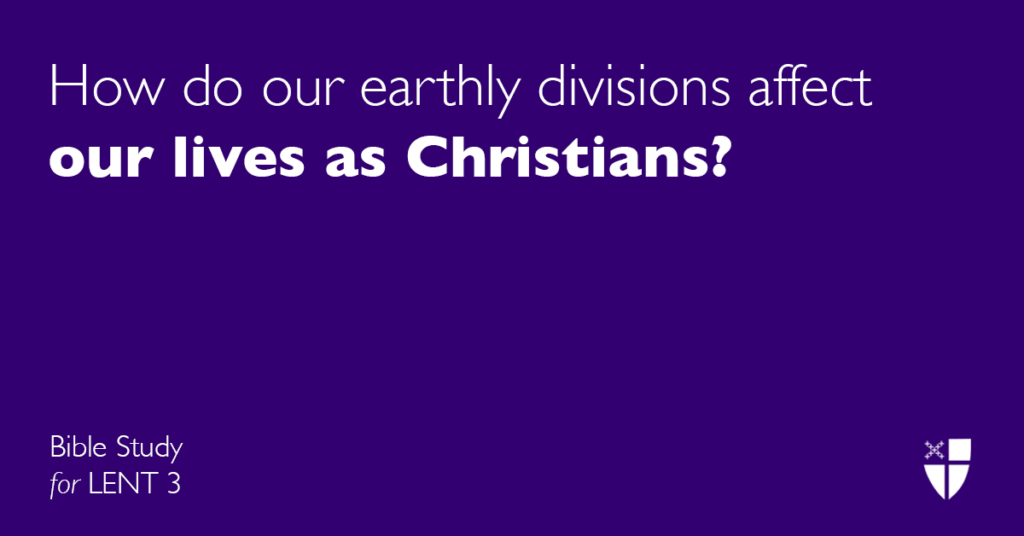This page is available in: Español
Bible Study: Lent 3 (B) – 2021
March 07, 2021
RCL: Exodus 20:1-17; Psalm 19; 1 Corinthians 1:18-25; John 2:13-22

Exodus 20:1-17
Moses and the Israelites have finally reached Mount Sinai. They’ve escaped their bondage in Egypt, and now God will lay out the expectations for their covenantal relationship. But before handing down the Decalogue, or the laws as the Israelites would understand them to be, God begins by reminding the people of all that God has done for them and consequently of God’s power and mercy. It is important that God, not Moses, delivers this message because God is inviting the people into a new relationship and way of being with God. While Moses has done a sufficient job leading the people, God’s choice to speak directly to them reminds them of God’s immense power and ensures them that God’s presence extends beyond their miraculous exodus and into their continual relationship. Additionally, the Decalogue balances the commandments of a right relationship with God with commandments that encourage a right relationship with neighbor. God is not merely concerned with how they treat their Lord but also how they care for one another.
- Where have you been reminded of God’s continuing power and presence in your life this week?
- As Christians, our lives too have been altered by God’s mercy and these commandments. How have these commandments affected your relationship with God and your neighbor?
Psalm 19
The Psalmist is in utter awe of the power of God and the perfection of God’s law. The first six verses illustrate God’s vast control over all of creation and the next four verses describe the “perfect,” “clear,” and “true” actions of God that make a relationship with God more desirable than wealth or sweet honey. The Psalmist ends with a plea to God to cleanse, protect, strengthen, and redeem the speaker because the Psalmist knows that nothing is beyond God’s realm or “hidden from its burning heat.” The Psalmist understands that as a human creature, he is not perfect and instead is susceptible to sins, both known and unknown. The Psalmist does not ask for God’s forgiveness, but rather petitions for God to work with the Psalmist so the Psalmist is not overtaken by sins. The Psalmist understands that our faith invites us into an active relationship with God where we are constantly invited to reflect, repent, and grow nearer to God.
- Read the Lent 3 collect. How is our petition similar to that of the Psalmist?
- How is Psalm 19 similar or different from the Book of Common Prayer’sconfession?
1 Corinthians 1:18-25
What standards do we use to evaluate humanity? Better yet, what standards do Christians use? The letter to the Corinthians is addressing the problem inherent in these questions by suggesting the apocalyptic reality of Christ’s entrance into humanity completely obliterates all necessity of evaluations. In Paul’s mind, the divisions present in the church at Corinth were unnecessary, superficial, and not the purpose of the cross. Instead, the cross signaled a new world and way of being. This is made clear with the inclusion of the scriptural reference to Isaiah (v.19) that compares the newly formed Christians in Corinth to the people of Judah, who trusted in their own wisdom rather than in God. The use of the rhetorical questions and reversal language invites the Corinthians to recognize their invitation, as Christians, into the new community that challenges their divisions and transforms their understanding of wisdom.
- For the Corinthians, life as a Christian was countercultural. Is this still true today? Why or why not?
- How do our earthly divisions affect our lives as Christians?
John 2:13-22
Speaking of reversal, John’s gospel account depicts Jesus literally flipping a table over. Is he angry, or simply trying to illustrate how divided the people still are? Juxtaposed against the earlier wedding at Cana, a story of unity and abundance, the story of the money changers in the Temple is a reminder that as Christians, our work is continuous and requires active participation. Christ is doing some “spring cleaning” and cleansing the people to prepare them for the new reality coming with his death and resurrection. While the people demand for a “sign,” they really want to see what authority Jesus has to speak and do such things. Unfortunately, the people fail to realize that the “sign” is right in front of them—in the person overturning tables. They are too caught up in their own lives to see the power of God at work.
- Who are you in this story?
- The penitential season of Lent invites us to get ready for the paschal mystery by inwardly examining our own lives and doing some “spring cleaning” of our own. What things do you need to let go of that are hindering your ability to see the power of God in your own life?
This page is available in: Español
Don’t forget to subscribe to the Sermons That Work podcast to hear this sermon and more on your favorite podcasting app! Recordings are released the Thursday before each liturgical date.
Receive Free Weekly Sermons That Work Resources!
This page is available in: Español


